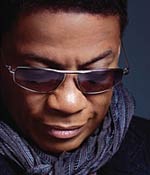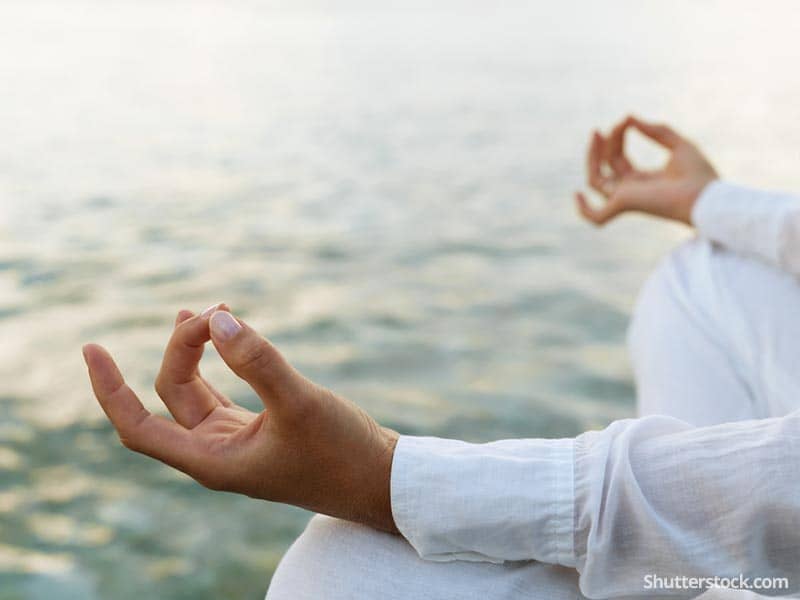 |
| Photo credit: Kwaku Alston |
Through much of his diverse career, Hancock, 67, has practiced Nichiren Buddhism (pronounce nee-chee-ren), a form of the philosophy that focuses on chanting the mantra Nam-myoho-renge-kyo as a path to enlightenement. It's no surprise that the Christian-raised artist would connect with a melody-based religion. Hancock recently talked to Beliefnet about how the Buddhist seed was planted in a smoky nightclub, why Buddhism is like jazz, and how the practice has taught him who he really is.
 Listen to Herbie Speak: Listen to Herbie Speak: |
|

What was it like recording Joni Mitchell's songs?
Before, I almost never paid attention to lyrics. I’m so bad that when I hear a song that’s sung, English is gibberish. I don’t hear it. I mean, I would have to translate it from whatever the thing is that I hear to intelligible English. Because I hear it as a sound.
You've been practicing Nichiren Buddhism for a long time, right?
Yeah, 35 years.
How did that begin?
Well, back in 1972, my band was playing music that required a very intuitive sense. It was an avant-garde approach to playing jazz. So it was very much in the moment and spontaneous. We had structure, but it was a very loose structure. So we went though a period when we were vegetarians because we would keep trying to find things that would help the flow of the music. I was very open at that time.
 |
The Magic of Buster Williams |
So the bassist Buster Williams starts playing this introduction. And what came out of him was something I’d never heard before. And not only had I not heard it from him, I’d never heard it from anybody. It was just pure beauty and ideas and—it was magical. Magical. And people were freaking out, it was so incredible what he was playing.
I let him play for a long time, maybe 10, 15 minutes. He just came up with idea after idea, so full of inspiration. And then I could feel myself waking up just before we really came in with the melody for the song. And I could tell that the whole band woke up, and there was some energy that was generating from Buster. We played the set and it was like magic. When we finished, many people ran up to the front of the stage and reached up their hands to shake ours. Some of them were crying they were so moved by the music. The music was very spiritual, too.
I knew that Buster was the catalyst for all of this, so I took him into the musicians’ room, and I said, “Hey, Buster, I heard you were into some new philosophy or something and if it can make you play bass like that, I want to know what it is.”
And then all his eyes lit up and he said, “I’ve been chanting for a way to tell you about this.” And I said, “What? Chanting what? What is this?” And now I know that it was the only way he could have reached me. That would be the only way I would have listened to what he had to say. If he had just come up and told me about it beforehand, I would have probably put my hand on his shoulder and said, “Hey, man, that’s great. You know, whatever works for you keep doing it,” which is a way of putting up a shield. But it came through the music, which was the only way to kind of reach my heart at the time, because that’s what my focus was then.
So, that was when he first told me about Buddhism and about chanting Nam-myoho-renge-kyo , which is the primary thing we do. It's the sound of the essence of everything. So, that was the beginning.
Then what happened?
I asked him some questions. I’d ask him one question, but his answers answered five or six questions that I already had in my head. Even though I had read some books on Sufism and Eastern thought, many of those things that I had read just brought up more questions than they did answers. This was the first time I was hearing something that was giving me simple answers to questions that answered more than one thing that I had in my mind. It all seemed to kind of tie together and work in such a beautiful way.
I mean, having been brought up in the Christian tradition, I had my own spin on Christianity. And most people that I knew that were Christians had their own spin on it. But what he was telling me sounded like my own personal take on religion and the way to look at things. And I said, "This sounds like what I always believed in anyway. I thought I was the only one." He said, “No, there are, you know, close to 20 million people that believe the same thing.”
I was kind of startled when he talked about Nam-myoho-renge-kyo being the law of the universe. The idea of cause and effect, which is what Nam-myoho-renge-kyo is about, made sense to me. I’m a guy that’s always been attracted to science—and cause and effect is what science is about. But I said, "I can’t just believe that chanting the sound is going to do something, so I don’t see how it could work for me."
He said, “Oh, you don’t have to believe it. It’s a law. So, if you just do it, it’ll--you’ll see the effect in your life. It doesn’t depend on you having to believe it first.”
That’s handy.
That was totally new to me. Because, to me, the idea of religion was always that you had to believe in it for it to work. But then I thought, Wait a minute. Gravity works whether you believe in it or not. And then, Should religion be weaker than natural science? And he said, "This religion is really based on cause and effect and actual proof." So I said, "Well, I have nothing to lose. Sure, I’ll check it out."
It was funny, too, because there were people hanging around Buster each night who seemed like they knew something. I don’t know how to describe it, but I saw them smiling a lot. And there was something that seemed to be deep inside them. Then I said, “Those people that have been hanging around, are they Buddhists?” He said, “Yeah." So, I was even more intrigued.
How did Buddhism change your music over time?
 |
On Practicing Buddhism |
Consequently, I’m able to come up with concepts for musical expression that are different every time. And that’s a request from myself—to make each record different than what I’ve done before, to have a particular function which would be my reason for doing the record. And even the idea of having function is something I never thought about before. I never thought in those terms—"What is the purpose, or what is the function of doing this? "
 |
Why Jazz Is Like Buddhism |
I also realize now that there’s an infinite way of looking at things. Sometimes you have to create a vision, a path for a vision. It may not be apparent and you may have to forge it yourself. And that will be the way to move your life forward.
I wonder if you could chant for us for a second?
 |
Chanting a Buddhist Meditation |
Nam-myoho-renge-kyo, Nam-myoho-renge-kyo, Nam-myoho-renge-kyo, Nam-myoho-renge-kyo, Nam-myoho-renge-kyo, Nam-myoho-renge-kyo. Nam-myoho-renge-kyo. That’s how we chant.
Thank you. That’s great.
You’re welcome.
What does that chant mean to you?
It is the name of life. It’s like the sound of life. When you invoke that by saying Nam-myoho-renge-kyo, that sound, that energy, touches everything in the universe. At the same time—and just think about this—within the life of a human being is the universe. So, we all have the universe inside at our core. That’s the microcosm. And then the physical universe that we see is a macrocosm. It takes the work of chanting and living your life, and listening to the signs that are a result of chanting, for the best pathway toward the development of your life, and the uncovering of your highest condition of life, which is your Buddha nature.
Cool.
 |
'Buddhism Is Inclusive' |
It sounds very enlivening.
It’s really cool. I can’t even begin to scratch the surface to tell you how great this practice really is. It’s life-changing in that, in doing this, you actually get closer to who you really are.
What have you discovered about who you really are?
That I’m a human being at the core. And that there's a great beauty to each human being. Each human being exists because there’s something they have to offer for the evolution of the universe that only they can fulfill.
It might be something as simple as saying the right word to the right person at the right time—and that could change the course of history. You never really know. But the whole thing is to work at the process of being in sync with the universe, so that everything will align at the proper time so that you can deliver that which is your life mission. And that’s why we’re here as individuals. And then there’s our contribution to the collective. It makes a lot of sense, doesn’t it?


